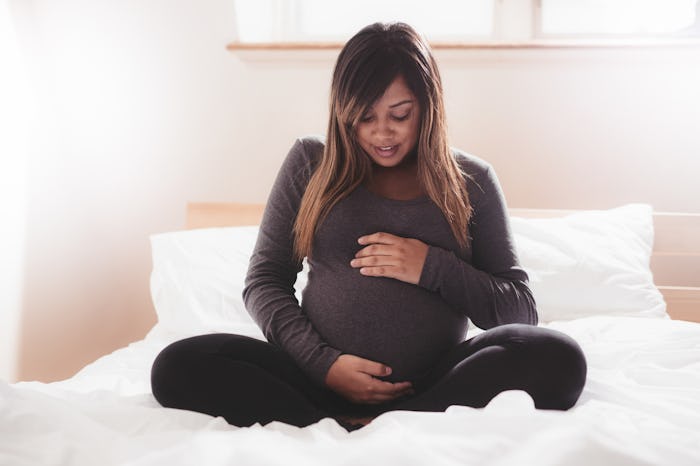Life

If You're Pregnant With Twins, Here's When Doctors Consider You Full Term
Pregnancy plays with your sense of time. It is at once the fastest 40 weeks of your life and also the slowest. From the day you see those two pink lines appear to the day you deliver, nothing is the same. For moms of multiples, this feeling is enhanced by the worry over preterm labor combined with the increased discomfort associated with having more than one baby to play home to. But what is the likelihood of preterm labor when you're pregnant with multiples? Can you go full term with twins, and what is actually considered full-term when it comes to multiples?
According to the Cleveland Clinic, full term with twins happens between weeks 37 and 38, and it is absolutely possible to go full term with twins. In fact, more women are making it to the finish line than ever before thanks to good diet, exercise, and adequate prenatal care, according to the Journal of Maternal-Fetal and Neonatal Medicine. While the journal noted that the likelihood of a preterm birth is much higher with twins and high-order (three or more) multiples than it is with a singleton pregnancy, carrying twins to term is no longer thought of as something out of the realm of possibility for most moms.
According to a study conducted and written by Fiona Cheong-See and colleagues of Queen Mary University in London, and published in BMJ, the ideal gestation for twins is 37 weeks. Her study found that in the case of both dichorionic (two placentas, fraternal) and monochorionic (one placenta, identical), the lowest risk is associated with birth occurring at 37 weeks. They wrote, "In dichorionic twin pregnancies, the perinatal risks are balanced until 37+0-6 weeks gestation, and until 36+0-6 in monochorionic pregnancies, with higher risks of stillbirths than neonatal deaths beyond this gestation."
However, your obstetrician might encourage you to wait until 38 weeks as that is still the gold standard delivery period accepted by medical professionals. The American College of Obstetricians and Gynecologists (ACOG) places term at 37 weeks or later for twin pregnancies, and wrote that "babies born before 37 weeks of pregnancy may have an increased risk of short-term and long-term health problems, including problems with breathing, eating, and staying warm. Other problems, such as learning and behavioral disabilities, may appear later in childhood or even in adulthood."
Ultimately, it's going to be between you and your provider to determine the best time for you to deliver your babies.
Just over a month ago, a good friend of mine had twins. I remember when she first found out she was pregnant with two, and she was asking about going full-term. She was rightfully concerned, but it turned out to be all for naught. Her doctor advised her to keep up with what exercise she could, and eat well, and she delivered a healthy baby boy and baby girl at 38 weeks and 2 days. Those little chunky monkeys were 7 pounds, 4 ounces and 7 pounds, 1 ounce.
Personally, I can't imagine being pregnant with well over 14 pounds of baby, but more women are doing it every year. Also, there are simply more twins being born now than ever before. According to Fit Pregnancy, "The twin birth rate in the United States is close to 1 in 31, a nearly 40 percent increase since the early 1980s." A lot of this is because more and more women are turning to fertility treatments to get pregnant, but as the Cleveland Clinic wrote, it's also because we're waiting longer to have children to begin with. Women over 35 are more likely to give birth to multiples. And they're also more likely nowadays to give birth to a set of healthy, full-term twins.
So if you're really worried, talk to your doctor about when you can be expected to go into labor and when your medical team will intervene if you're too close to your due date. Twin pregnancies can be trickier than singleton pregnancies, but that doesn't mean you can't make it to full term.